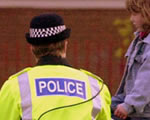 Go to main content
Go to main content
Archive Website of the UK government
Please note that this website has a UK government accesskeys system.
Main menu
Page menu
Crime and justice

Neighbourhood policing

Every neighbourhood is different - and so are the problems faced by the people who live there. Neighbourhood policing teams work directly with residents to find out what those crime and anti-social behaviour problems are and help get them resolved. You can get involved by attending their monthly meetings, or by contacting them to let them know about your concerns.
Neighbourhood policing teams
All police forces have neighbourhood policing teams and each has responsibility for a fairly small area. The exact area covered varies, but every neighbourhood has a dedicated team. These teams are mainly made up of police officers, police community support officers (PCSOs) and special constables, working closely with local council staff and volunteers.
Each team holds regular meetings with residents to find out what their local priorities are. Those meetings happen at least monthly, and can be more frequent.
If you’re worried about crime or anti-social behaviour in your neighbourhood, you can also attend one of their regular meetings to let them know. You'll also be able to find out more about what they’re doing about the issues that concern you.
You can also stop your local team when you see them out on patrol. Alternatively, you could contact them by phone or email, or make an appointment to meet with them at a time that suits you.
In an emergency, though, you should not call your neighbourhood policing team. If a crime is happening, if you feel threatened, or if you or somebody else has been injured, you should dial 999.
Find your neighbourhood policing team
Each neighbourhood policing team has its own section on the police website, which should be regularly updated with local information.
In your team's section you'll be able to find:
- their contact details
- when and where the next neighbourhood policing team meeting will be held
- police priorities that have been agreed with residents in your area
- information about action being taken by police to deal with problems raised by you and your neighbours
- information about crime and anti-social behaviour in your neighbourhood
- information about how you can get involved and help prevent crime
Find your neighbourhood policing team using the link below.
Get involved with local anti-crime work
Across the country, local groups work with neighbourhood policing teams and residents to encourage people to get involved in making their towns safer.
By getting involved, you can share your concerns about crime or anti-social behaviour, and help set priorities for your neighbourhood policing team and the police.
If you want to help, contact your local neighbourhood policing team to find out which anti-crime groups you can join in your area.
 Facebook
Facebook Twitter
Twitter StumbleUpon
StumbleUpon Delicious
Delicious Reddit
Reddit